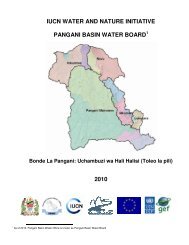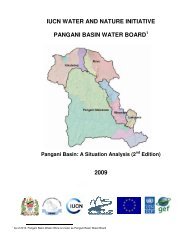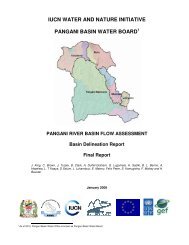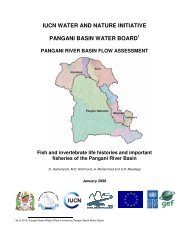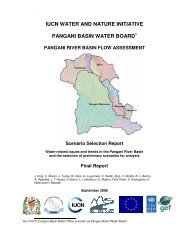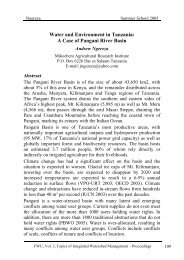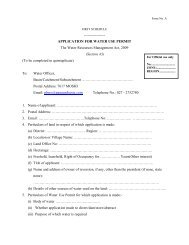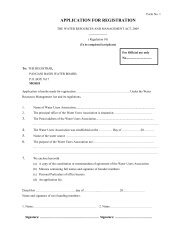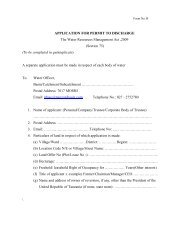Managing Conflicts Over Land and Water Resources in Pangani River
Managing Conflicts Over Land and Water Resources in Pangani River
Managing Conflicts Over Land and Water Resources in Pangani River
Create successful ePaper yourself
Turn your PDF publications into a flip-book with our unique Google optimized e-Paper software.
<strong>Manag<strong>in</strong>g</strong> <strong>Conflicts</strong> <strong>Over</strong> <strong>L<strong>and</strong></strong> <strong>and</strong> <strong>Water</strong> <strong>Resources</strong> <strong>in</strong> <strong>Pangani</strong> <strong>River</strong> Bas<strong>in</strong><br />
1. Background<br />
The study to facilitate the formulation of better policies <strong>and</strong> guidel<strong>in</strong>es for manag<strong>in</strong>g resource<br />
use conflicts <strong>in</strong> plural legal systems, was prompted by current l<strong>and</strong> <strong>and</strong> water reforms that are<br />
underway <strong>in</strong> most African countries. These reforms focus on the use of statutory legal systems<br />
to regulate the use of l<strong>and</strong> <strong>and</strong> water resources. However, all of these countries have a<br />
pluralistic legal system - l<strong>and</strong> <strong>and</strong> water resources are regulated by different pieces of<br />
legislation <strong>and</strong> <strong>in</strong>stitutions, <strong>in</strong>clud<strong>in</strong>g statutory law, customary laws of the different ethnic<br />
groups <strong>and</strong> Islamic law. The diverse customary norms <strong>and</strong> laws are often more important than<br />
statutory law <strong>and</strong> are relied upon <strong>in</strong> resolv<strong>in</strong>g natural resource management conflicts. In these<br />
countries, statutory laws regulate very few human activities. Neglect of customary laws may<br />
have negative consequences for <strong>in</strong>dividuals <strong>and</strong> groups who were better served by customarybased<br />
systems.<br />
2. General <strong>and</strong> Specific Objectives of the Study<br />
Given the above background, the study was set to <strong>in</strong>vestigate how conflicts over l<strong>and</strong> <strong>and</strong><br />
water resources are managed <strong>in</strong> <strong>Pangani</strong> river bas<strong>in</strong>. The general objective of the research<br />
project was to describe <strong>and</strong> analyse customary <strong>and</strong> statutory systems of utilis<strong>in</strong>g <strong>and</strong> manag<strong>in</strong>g<br />
l<strong>and</strong> <strong>and</strong> water <strong>in</strong> the study area. The research had three specific objectives:<br />
• to analyse the extent to which there are differences <strong>in</strong> the management of l<strong>and</strong> <strong>and</strong> water<br />
resources between farmers with customary <strong>and</strong> those with statutory tenure rights;<br />
• to analyse how differences <strong>in</strong> tenure affects the resolution of conflicts over access to <strong>and</strong><br />
use of l<strong>and</strong> <strong>and</strong> water resources; <strong>and</strong><br />
• to identify legal <strong>and</strong> socio-economic factors that facilitate <strong>and</strong>/or constra<strong>in</strong> efforts towards<br />
sound management of l<strong>and</strong> <strong>and</strong> water <strong>in</strong> the study area.<br />
3. Methodology<br />
Us<strong>in</strong>g the <strong>Pangani</strong> river bas<strong>in</strong> as the study area, the team sought to achieve the def<strong>in</strong>ed<br />
objectives through the follow<strong>in</strong>g set of approaches:<br />
• .Literature review<br />
• Archival search<br />
• Fieldwork<br />
• Feed-back workshops<br />
4. Outputs/Intended Policy Use<br />
On completion of this study, the follow<strong>in</strong>g outputs were expected:<br />
• A documentation of local l<strong>and</strong> <strong>and</strong> water conflicts, <strong>and</strong> the complementarities/tensions<br />
between statutory <strong>and</strong> customary systems of address<strong>in</strong>g conflicts.<br />
• Guidel<strong>in</strong>es on implement<strong>in</strong>g Integrated <strong>Water</strong> <strong>Resources</strong> Management under plural<br />
legal systems.<br />
Draft F<strong>in</strong>al Report for ECAPAPA<br />
2



